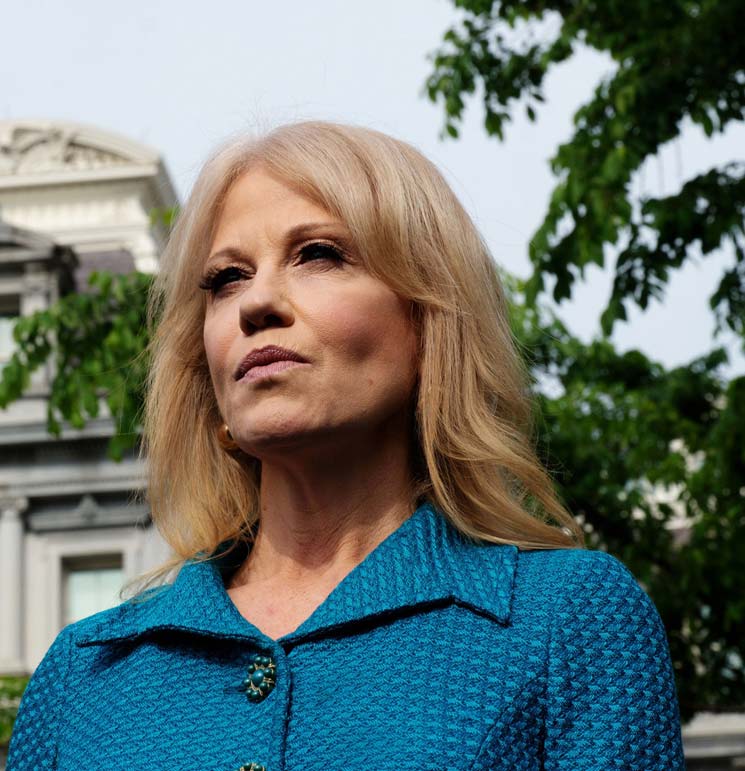 Stefani Reynolds for Bloomberg
Stefani Reynolds for Bloomberg
Americans deserve a federal government that works for all of them, not just the people they agree with. That's the philosophy behind the Hatch Act, which prevents federal employees from engaging in political activity while on the job. The law has cost local, state and federal employees their jobs for decades.
And President Donald Trump adviser Kellyanne Conway is one of the most egregious violators of it in modern memory by constantly bashing Democrats as an official for the White House, according to the watchdog office that prosecutes such claims. On Thursday, that office released a report recommending that Conway should be removed from her office.
"Since at least February 1, 2019, Ms. Conway has repeatedly violated the Hatch Act during her official media appearances by making statements directed at the success of your reelection campaign," the report, addressed to Trump, read.
Conway's case is also remarkable in that "she seems to not only be blatantly doing it, but to be rather in-their-face about it, that she just doesn't care about the Hatch Act," said Larry Noble, an ethics advocate and former general counsel of the FEC.
Here's how the Hatch Act works and what Conway did wrong, according to the law:
It was set up in the Great Depression-era after Democratic officials were found to be using federal workers of the Works Progress Administration to help them campaign in swing states. One intention of the 1939 law was to protect federal works from such pressure - do x political activity or lose your job, explains the Congressional Research Agency.
But it also serves to separate the lines between public office and politics.
Local government officials have gotten in trouble via the legislation for running for an elected, partisan office. Federal government workers can get in trouble for sending partisan tweets. Some Obama administration Cabinet secretaries who talked politics on the job were found to have violated it.
The law set up a special body, the Office of Special Counsel, to investigate and subsequently determine violations of the Hatch Act. (That is not the same as the special counsel's office that put together the Mueller report into Russian election interference.) The Supreme Court has twice upheld the law's constitutionality, saying it does not prohibit an employee's free speech. (They can say whatever they want in their free time.)
Violating the law can be a career-ending error. But you can't go to jail for it. "It's not a criminal offense; it's a firing offense," Kathleen Clark, an expert on legal ethics at Washington University in St. Louis, told me when we were examining allegations that then-FBI Director James Comey might have violated it.
Ultimately, your boss is the one who metes out the punishment. There have been some federal employees who have recently lost their jobs for this, but as Conway demonstrates, the higher up you are, the more wiggle room you have to avoid punishment.
Last year the office sought the removal of a National Oceanic and Atmospheric Administration employee for repeated Hatch Act violations, said Delaney Marsco, the legal counsel for ethics at the Campaign Legal Center. In 2014, the office got a Federal Election Commission attorney who had posted partisan tweets and criticized the Republican Party in a media interview to resign.
Cabinet officials are frequent targets of Hatch Act investigations. They often come from political backgrounds, and the line between their day job and future political ambitions can get blurry quickly, especially in the social media era. Trump's former United Nations ambassador, Nikki Haley, was found to have violated the law when she retweeted Trump's endorsement of a congressional candidate.
A couple of President Barack Obama's Cabinet secretaries were found in violation of it, though nothing really happened to them, either.
Julian Castro, then Obama's secretary for housing and urban development, was found in violation after announcing in a media interview that he was taking "off his HUD hat for a second" to talk politics. That wasn't a clear enough delineation between his private and public life, the watchdog found.
In 2012, Kathleen Sebelius, then the secretary of health and human services, was talking to a gay rights organization about the Affordable Care Act when she said one of the imperatives is that "we make sure that in November [President Obama] continues to be president for another four years."
Hilda Solis, then the secretary of labor, was under investigation for potentially violating the Hatch Act for allegedly helping in fundraising for Obama's reelection campaign.
But most of those officials at least expressed some remorse for possibly breaking the law. What Conway is doing is a whole other level of violation, say experts.
"Blah, blah, blah," Conway said in May about the issue. "If you're trying to silence me through the Hatch Act, it's not going to work. Let me know when the jail sentence starts."
The White House told The Washington Post that Trump is more likely to defend Conway than punish her. Already, the White House has accused the Office of Special Counsel of playing politics itself or trying to limit Conway's free speech. That kind of disregard for the law defangs it in a big way, Marsco said.
No White House official has been recommended to be removed from office under the Hatch Act before. The head of the counsel that prosecutes these cases, a Trump appointee, told The Post that it's "unprecedented" to find someone so high-profile in such violation of it.


 Contact The Editor
Contact The Editor
 Articles By This Author
Articles By This Author